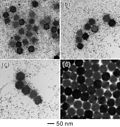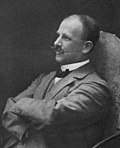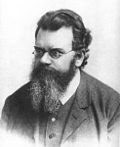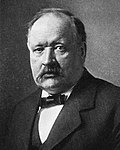Friedrich Wilhelm Ostwald (German pronunciation: [ˈvɪlhɛlm ˈɔstˌvalt] ; 2 September [O.S. 21 August] 1853 – 4 April 1932) was a Baltic German chemist...
49 KB (5,220 words) - 23:49, 5 October 2024
crystals or sol particles was first described by Wilhelm Ostwald in 1896. For colloidal systems, Ostwald ripening is also found in water-in-oil emulsions...
19 KB (2,343 words) - 03:49, 3 November 2024
The Ostwald process is a chemical process used for making nitric acid (HNO3). The Ostwald process is a mainstay of the modern chemical industry, and it...
9 KB (1,032 words) - 16:49, 9 October 2024
In colorimetry, the Ostwald color system is a color space that was invented by the Baltic German chemist Wilhelm Ostwald. Associated with The Color Harmony...
6 KB (803 words) - 02:15, 10 December 2023
Ostwald may refer to: Friedrich Wilhelm Ostwald, the physico-chemist (awarded the Nobel Prize in Chemistry, 1909) Ostwald's rule of polymorphism: in general...
759 bytes (127 words) - 15:07, 2 October 2023
The Wilhelm Ostwald Institute for Physical and Theoretical Chemistry at the University of Leipzig, located at Linnéstraße 2 in Leipzig, is the oldest...
40 KB (5,021 words) - 15:22, 27 September 2022
international auxiliary language by chemist and interlinguist Wilhelm Ostwald. Published in 1916 in Ostwald's Monistic Sunday Sermons (German: Monistische Sonntagspredigten)...
24 KB (2,281 words) - 03:50, 5 November 2024
Energeticism was developed during the end of the 19th century by Wilhelm Ostwald, Georg Helm and Pierre Duhem. It was also promoted by physicist Ernst...
12 KB (1,346 words) - 00:37, 7 November 2024
Richard Abegg (redirect from Richard Wilhelm Heinrich Abegg)
began researching physical chemistry while studying with Friedrich Wilhelm Ostwald in Leipzig, Germany. Abegg later served as private assistant to Walther...
9 KB (887 words) - 17:13, 5 May 2024
Robert Bunsen (redirect from Robert Wilhelm Bunsen)
Physikalische Chemie hrsg. von Wilhelm Ostwald und Max Bodenstein. 3 Bände. Leipzig: W. Engelmann, 1904 Crew, H. (1899). "Robert Wilhelm Bunsen". The Astrophysical...
18 KB (1,696 words) - 09:16, 21 October 2024
In materials science, Ostwald's rule or Ostwald's step rule, conceived by Wilhelm Ostwald, describes the formation of polymorphs. The rule states that...
3 KB (298 words) - 05:56, 24 September 2024
Law of dilution (redirect from Ostwald's dilution law)
Wilhelm Ostwald’s dilution law is a relationship proposed in 1888 between the dissociation constant Kd and the degree of dissociation α of a weak electrolyte...
5 KB (732 words) - 11:31, 14 March 2024
color space. Levkowitz and Herman (1993) Wilhelm Ostwald (1916). Die Farbenfibel. Leipzig. Wilhelm Ostwald (1918). Die Harmonie der Farben. Leipzig....
91 KB (10,772 words) - 19:46, 22 July 2024
by the physical chemist Wilhelm Ostwald and is now published by Europa-Lehrmittel. The series was first published by Wilhelm Engelmann in Leipzig and...
10 KB (1,069 words) - 15:15, 22 March 2023
Physical Chemistry and Chemical Physics". It was established in 1887 by Wilhelm Ostwald, Jacobus Henricus van 't Hoff, and Svante August Arrhenius as the first...
2 KB (159 words) - 22:45, 14 July 2022
its most notable graduates are the Latvian-born Nobel Prize laureate Wilhelm Ostwald, the legendary Mayor of Riga George Armitstead, the former President...
19 KB (1,816 words) - 01:38, 22 October 2024
well, including Georg Bredig, a student and later an assistant of Wilhelm Ostwald in Leipzig.: 43 Bunte and Engler supported an application for further...
67 KB (7,282 words) - 00:03, 5 October 2024
History of fertilizer (section The Ostwald process)
of the Ostwald process. The Ostwald process is a chemical process for production of nitric acid (HNO3), which was developed by Wilhelm Ostwald (patented...
15 KB (1,802 words) - 16:01, 5 September 2024
an 1897 translation of the German unit Mol, coined by the chemist Wilhelm Ostwald in 1894 from the German word Molekül (molecule). The related concept...
26 KB (3,294 words) - 05:24, 27 October 2024
Pipette (section Ostwald–Folin pipette)
serologic pipettes for volumetric analysis. The Ostwald–Folin pipette, developed by Wilhelm Ostwald and refined by Otto Folin, is a type of volumetric...
23 KB (2,477 words) - 05:21, 27 August 2024
Boltzmann went to the University of Leipzig, on the invitation of Wilhelm Ostwald. Ostwald offered Boltzmann the professorial chair in physics, which became...
48 KB (5,382 words) - 00:04, 24 October 2024
chemistry, such as Rudolf Clausius, Wilhelm Ostwald, and Jacobus Henricus van 't Hoff. They were far more impressed, and Ostwald even came to Uppsala to persuade...
38 KB (4,163 words) - 08:49, 13 September 2024
(1921–2023), American physician and recipient of the Paul Loicq Award Wilhelm Ostwald (1853–1932), Baltic German chemist and winner of the Nobel Prize in...
106 KB (9,440 words) - 16:48, 7 November 2024
behaviour of dilute solutions and gases. In 1887, he and German chemist Wilhelm Ostwald founded an influential scientific magazine named Zeitschrift für physikalische...
17 KB (1,664 words) - 09:15, 13 September 2024
physical chemistry, and studied with Walther Nernst at Göttingen and with Wilhelm Ostwald at Leipzig. While working in Nernst's lab, Lewis apparently developed...
37 KB (4,207 words) - 17:36, 9 November 2024
derived it only 6 years later. The attribution to Gibbs goes back to Wilhelm Ostwald, who first translated Gibbs' monograph into German and promoted it...
9 KB (1,184 words) - 19:03, 12 August 2023
occupied by the constituent molecules. Spearheaded by Ernst Mach and Wilhelm Ostwald, a strong philosophical current that denied the existence of molecules...
25 KB (3,021 words) - 16:51, 2 September 2024
kinetics of this reaction. His work was noticed 34 years later by Wilhelm Ostwald. In 1864, Peter Waage and Cato Guldberg published the law of mass action...
24 KB (3,326 words) - 19:09, 2 November 2024
banding in his observations from the results of an experiment, and Wilhelm Ostwald provided the earliest explanation for the phenomenon. The purpose of...
11 KB (1,196 words) - 07:07, 24 August 2024
338 mm. The Weltformat (world format) was developed by German chemist Wilhelm Ostwald in 1911 as part of Die Brücke, around the same time DIN 476 was first...
101 KB (7,884 words) - 15:34, 6 November 2024

















